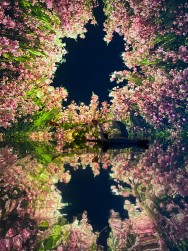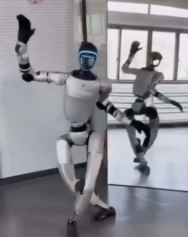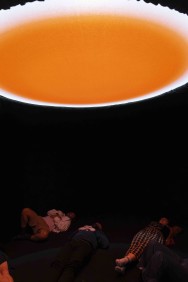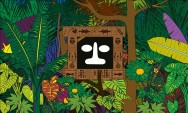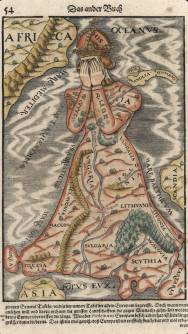Exhibition
Beyond Gravity Festival 2025
In addition to stage plays, the programme of the Beyond Gravity Festival 2025 also presents performative installations, (interactive) games and media art positions in the form of an exhibition, which can be experienced in the central hall of the Depot, in Studio 2 and A29 of the Depot, and in Lab 2 of the Academy for Theatre and Digitality.
Admission to the exhibition is free.
Most of the works run in a loop, only Meditation on Country has fixed start times and a limited number of viewers who can see the work at any one time. Please simply register on site.
The multi-channel installation Turbulence by Norbert Pape can change its character and be activated performatively through the participation of visitors who interact with it wearing VR headsets. An admission ticket is required for these performances – it can be found here.
opening hours
Wednesday, 01.10.2025
6 pm - 11 pm
Thursday, 02.10.2025
6 pm - 10 pm
Exhibition section in the Academy open from 6 pm to 8:30 pm
Friday, 03.10.2025
6 pm - 10 pm
Exhibition section in the Academy open from 5 pm - 7:30 pm
Saturday, 04.10.2025
2 pm - 10 pm
Exhibition section in the Academy open from 12 noon - 6:30 pm
Sunday, 05.10.2025
2 pm - 10 pm
Exhibition section in the Academy open from 10:30 am - 5 pm
About the works
In the central hall of the depot, we are showing Turbulence, the new work by Norbert Pape (and Team). In this multi-channel XR installation, visitors enter a sphere that no longer focuses on humans but, with the help of digital technologies, opens up insights into a world in which the perceiving and thinking subject is no longer at the centre. What other perspectives open up to visitors in this metaphysical sphere, which is at the same time strongly bound to the encountering and moving bodies?
In their work You better (don’t) move the Dortmund-based duo Ruhrgebieterinnen presents a form of worldbuilding that depends on the behaviour and movement of visitors. Every action has an effect – on global relationships, on the atmosphere and on what we call nature. What new picture of mutual influence does this setup reveal? What new questions about responsibility arise? How differently does Western man position himself as part of a nature that he has tried to subjugate for centuries?
Everything is Computer by Laura Cugusi, machine yearning/Nada Zanhour and Federico Zurani is a game-essay installation that deals with the capitalist world-building fantasies of American technology corporations, in particular their obstructive qualities, which find their real-world echo in the engagement of right-wing political movements and their fantasies of contemporary control. Set in a post-apocalyptic world ruled by an artificial general intelligence born of these fantasies, the game raises questions about possible ways out – can we find them, and where do they lead? (The project is part of the Decolonising the Digital residency programme).
The decolonial game Folds of Separation by independent Indian developer studio Oleomingus focuses on the boundary between private and public space. How much public engagement – how much public protest, how much public opinion – can one afford in a state that is increasingly restricting spaces for the public expression of opinions and positions, while employing disciplinary strategies from the era of historical colonialism? Against the backdrop of the imprisonment of activists, authors, reporters and lawyers in contemporary India, Oleomingus has designed this game and leads visitors through seemingly endless labyrinths in search of comforting communities. (The project is part of the Decolonising the Digital symposium programme.)
Angie Abdila's video installation Meditation on Country combines indigenous knowledge and Western astrophysics in its depiction of the time of creation and evolutionary events. The immersive experience of the installation is created by combining scientific and cultural data elements using a selection of machine learning (ML) models trained through cultural programming protocols. This exploration of technology as a cultural practice aims to deepen our connection to the universe and the landscape through the power of resonance, language and storytelling. (The project is part of the Decolonising the Digital symposium programme.)
The project KAM / Noble by Viviane Maghela, Eric Takukam and Enya Obert has its roots in Africa's rich cultural heritage and aims to give minorities a stronger voice in the global digital sphere. The project team's artistic research process deals with questions of translating indigenous knowledge – in this case, the Bamileke culture – into digital contexts. How can we reimagine a world in which digital and traditional technologies coexist harmoniously? (The project is part of the Decolonising the Digital residency programme).
Pangea in Latent Space and the Tectonics of Otherness by the collective Pangea IA (Maria Luisa Angulo & Marlon Barrios Solano) interweaves work, art, technology and critical theory as independent areas of creation and research, with a particular focus on the body and movement in the context of the performing arts. Starting from the observation that contemporary technologies, and AI in particular, are not neutral tools, Pangea IA examines these technologies as a latent space, a territory of diverse possibilities in which the meaning of the future is outlined and discarded. From a decolonial perspective rooted in experiences of migration, Pangea IA proposes a reconfiguration of this space with the help of a situated, critical and poetic sensibility towards technologies and their relationship to bodies in real space. (The project is part of the residency programme Decolonising the Digital).
Addresses
Mittelhalle, Studio 2 and A29
Kulturort Deport
Immermannstrasse 29
44147 Dortmund
Lab 1 and Lab 2
Akademie für Theater und Digitalität
Speicherstrasse 17
44147 Dortmund

